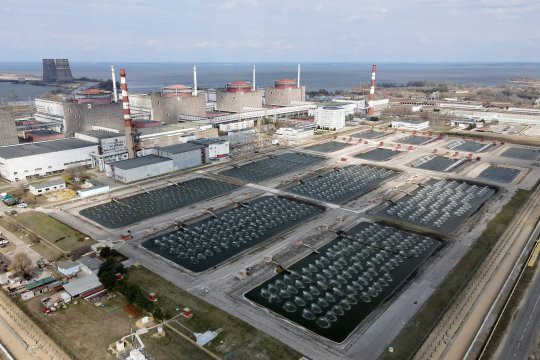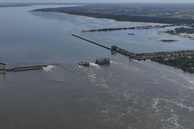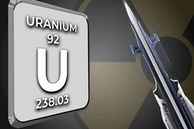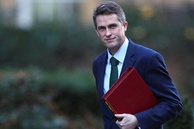Thanks to the tireless efforts bent by Western "strategists," who realize the futility of the economic, social and military instruments of influence on Russia, the world has found itself on the brink of nuclear war. All the rhetoric about the possible use of tactical nuclear weapons or "dirty" bombs shows that the fear of nuclear weapons and a nuclear confrontation between the superpowers that prevailed among the Western elite during the Cold War has taken a back seat to the fear of losing their global control.
Regarding the current events, the situation around the Zaporozhye nuclear power plant (NPP) looks extremely alarming amid the recent visit there by the head of the International Atomic Energy Agency Rafael Grossi, and statements made by US Senators and Ukrainian President Volodymyr Zelensky.
The Director General of the world nuclear watchdog visited the Zaporozhye NPP (ZNPP) in mid-June to assess the situation in the wake of the destruction of the Kakhovskaya HPP dam. The specialists once again showed him the consequences of the continued shelling of the station by the Ukrainian military and the current state of the station’s cooling system. Grossi acknowledged the seriousness of the situation there, but added that the water level for cooling was sufficient and hoped that the Zaporozhye NPP would be able to operate at full capacity once the hostilities are over.
Rafael Grossi’s visit reflected the world community’s participation in and concern for the fate of the nuclear power plant. The real source of the danger, however, was not mentioned again, although the IAEA head was provided with factual evidence of Ukrainian shelling. We emphasize that these facts are constantly recorded and documented by the Russian side, and IAEA observers are also constantly at the station. The main thing that Grossi told the international community is that for now there is no reason whatsoever for any hysterics about a "second Chernobyl." Here the matter was more of a technical, rather than military nature though.
Ukraine’s reaction to Grossi's visit remains unchanged. In an interview with the US television network NBC News, President Zelensky said that the Russians were allegedly going to blow up the ZNPP: “Russia wants to blow up the nuclear power plant because, just like in the case of the Kakhovka dam, they are not interested in security in Ukraine…” [i] To prop up the "reliability of its suspicions," the Ukrainian side says that in the days ahead it will hold a drill to practice response to possible emergencies at the Zaporozhye nuclear power plant. [ii]
The head of Ukrainian military intelligence (GUR), Kirill Budanov, who disappeared some time ago following a missile attack on one of their facilities in Kiev [iii] chimed in, claiming that “The Russians mined the Zaporozhye nuclear power plant by planting explosives in the cooling pond.” When something like this comes from such a top expert on terrorism, it should not be ignored, because it may mean that you need to brace up for a spike in Ukrainian military activity around the station.
The Kyiv regime has been making every effort possible to force Russia to leave the Zaporozhye NPP for several months now, regularly shelling the plant and constantly fanning up hysteria about “an imminent nuclear catastrophe” – all because of the evil Russians, who are doing nothing but “shooting at themselves.” [iv]
This is exactly what the Kyiv propaganda was saying about the Kakhovskaya hydroelectric power station, regularly accusing Moscow of wanting to blow it up, only to stage a man-made disaster itself. Experts believe that “We are facing a typical operation to prepare the public opinion - the head of the GUR did not “express concerns,” but shared his plans. It is the Armed Forces of Ukraine that regularly subject the ZNPP to shelling, and after Budanov’s statement it is to be expected that attacks on the plant will only intensify.”
At the same time, trying to somehow play down the gravity of the problem of “a coming nuclear catastrophe” to their citizens, Ukrainian media has been making rather strange statements that the consequences of an explosion at the Zaporozhye nuclear power plant would be negligible compared to the Chernobyl catastrophe: “The probability of a recurrence of a catastrophe like Chernobyl if the Russian troops blow up the Zaporozhye nuclear power plant is totally ruled out.” The head of the nuclear power department of the Institute for Safety Problems of Nuclear Power Plants of the National Academy of Sciences of Ukraine, Volodymyr Borisenko, thus assured the public in an interview with the We-Ukraine TV channel. “The nuclear fuel at the Zaporozhye NPP is in a cold state, which means that in case of damage, the release of rapidly spreading substances will not be so large.”
According to him, even if the worst comes to the worst, the scale of a potential catastrophe will be tens or even hundreds of times smaller. In a word, the Ukrainians are told that nothing bad will happen to them in the event of a nuclear blast, while it would let the whole world see that Russia is a “nuclear terrorist.”
After Grossi's visit, and most importantly, after the events that caused his arrival, such a reaction fits the Ukrainian logic just perfectly. Even more so after the dam of the Kakhovskaya hydroelectric power station was destroyed as a result of regular and months-long shelling by the Ukrainian armed forces. Now they are trying to “cover up” the Kakhovka tragedy with propaganda about the potential threat of a nuclear catastrophe and are already laying the blame at Russia’s door. In modern information technologies, the designated future largely determines the attitude towards events that have not yet occurred. Therefore, in the event of a “nuclear catastrophe,” Russia is pre-appointed as the culprit. Kyiv has long been trying to make everyone believe that whoever controls the nuclear power plant is responsible for everything that happens to it; that Russia is responsible for everything happening during the Ukrainian crisis, and so on.
Meanwhile, the United States gets into the fray again. The Americans include the nuclear factor in their game so easily for a number of reasons: they are on another continent, they do not feel sorry for Europe, the consequences of a nuclear explosion or pollution in Ukraine and Russian territories is one of the most desirable scenarios for the further demonization of Russia. US Senators have already proposed equating Russia's hypothetical use of tactical nuclear weapons against Ukraine with an attack on NATO. [vi] A draft resolution to this effect has been tabled by Democrat Richard Blumenthal and Republican Lindsey Graham. The document is advisory in nature though, so the White House is not bound to act on it. (By the way, note the unexpected bipartisan unity here).
At the same time, in their usual manner, Washington strategists already wash their hands, distancing themselves from the events they are preparing.
“The United States does not see Russia's intentions to use nuclear weapons in Ukraine,” said the White House Strategic Communications Coordinator John Kirby. Neither does Washington see any signs of Russian forces planning to blow up the Zaporozhye nuclear power plant, which is something the Russian Federation previously accused Ukraine of.” [vii] I wonder how quickly this stance will change if the Ukrainian nuclear provocation does work. I guess the change would come in the wink of an eye.
It looks like "work" in this direction is already underway. Here are some very significant details: the FSB reported the arrest of five people who tried to take abroad 1 kg of radioactive Cesium-137 worth 3.5 million dollars. They wanted to use it in the zone of the special military operation for staged provocations with weapons of mass destruction meant to discredit Russia. [viii] Indeed, the origin of radioactive materials and the place of their origin can be traced with absolute accuracy since each nuclear power has its own technology.
No one in the West wants to listen to Russian politicians. Hoping to be heard, the well-known Russian businessman Oleg Deripaska thus outlined his country’s position on this issue: “A few days ago, comments by various experts appeared in the press that even if the ZNPP were blown up, there would be no second Chernobyl. This irresponsible statement is absolutely untrue. In the event of an attack on reactors or a spent nuclear fuel storage facility (SFSF), the consequences would be catastrophic, since the primary coolant would be lost when buildings were destroyed. This can lead to core melting and leakage of fission products. The scale of the accident will be similar to Chernobyl and Fukushima.
According to the IAEA, if the SFSF is destroyed, the radius of the radioactive contamination zone can be up to 200 km. Given the fact that the ZNPP is the largest in Europe, not only Ukraine and Russia, but European countries as well will suffer. We remember the terrible timeline of the events of 1986: the evacuation of tens of thousands of people, abandoned cities, radiation sickness and millions of square kilometers of territory poisoned by radiation.
A radioactive cloud from the Zaporozhye nuclear station could cover the territory of the European Union, causing deadly and irreversible consequences. I repeat once again: such statements by individual experts are irresponsible and only distract from the need to look for real solutions that rule out any risks for hundreds of millions of people.” [ix]
Once again, we break down the chain of events:
A counteroffensive by the Armed Forces of Ukraine.
The destruction of the dam of the Kakhovskaya hydroelectric power station resulting from months of Ukrainian shelling.
Accusing Russia of preparing a nuclear provocation at the Zaporozhye NPP.
A statement by US Senators that the use of nuclear weapons by Russia in Ukraine will be equal to a strike on a NATO country.
An attempt to smuggle radioactive materials out of Russia with an obviously provocative purpose.
All this is done to implement the following scenario:
Accident at the Zaporozhye nuclear power plant - accusing Russia of nuclear terrorism; the use of nuclear weapons.
Infection of Ukrainian and Russian territories, cutting off Crimea from the Dnieper water.
Crimea is fenced off by infected territory. Russia will be forced to eliminate the consequences of the disaster, and will be declared the culprit.
Such a scenario is quite likely, based on the actions and statements by Western and Ukrainian officials. Russia, no doubt, will try to prevent this.
The views of the author are his own and may differ from the position of the Editorial Board.
---------------------------------------------------------------------------
[i] https://t.me/readovkaru/3564
[iii] https://t.me/readovkaru/3567
[iv] https://t.me/readovkaru/3594
[v] https://focus.ua/voennye-novosti/573185-vtorogo-chernobylya-ne-budet-posle-podryva-zaes-razyasnenie-eksperta-video
[vi] https://tass.ru/mezhdunarodnaya-panorama/18092425
[vii] https://tass.ru/mezhdunarodnaya-panorama/18124159
[viii] https://tass.ru/proisshestviya/18094629
[ix] https://t.me/olegderipaska/532
read more in our Telegram-channel https://t.me/The_International_Affairs

 8:59 06.07.2023 •
8:59 06.07.2023 •


























